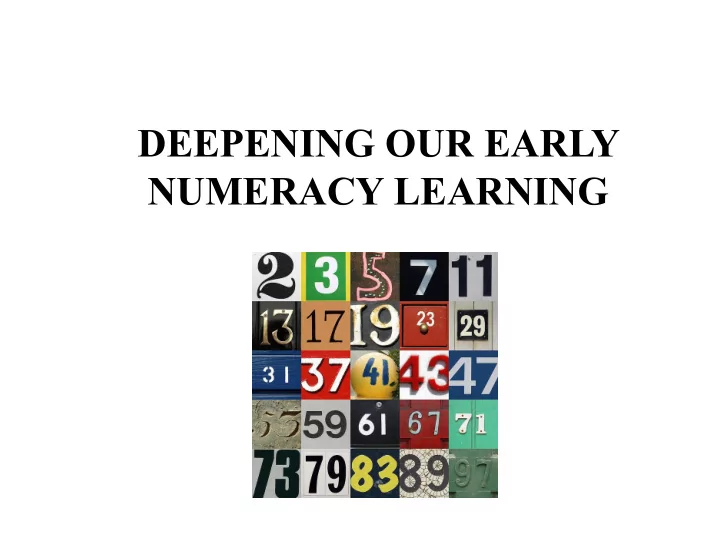

DEEPENING OUR EARLY NUMERACY LEARNING
WHY ARE WE TALKING SO MUCH ABOUT MATH LATELY? • What can kids learn? Research about the importance of early experiences and the development of the brain. • What should we be teaching? The State-wide move to Full Day Kindergarten (FDK) for all students. • How can Early Learning providers do a better job? The push for Washington’s new quality rating system - Early Achievers for all licensed childcare facilities. • What does the data say about where kids are coming up short? The results of the Washington Kindergarten Inventory of Developing Skills (WaKIDS).
What is WaKIDS? Video Link (or click on the picture) 3
How prepared are Washington Kids for Kindergarten? http://www.k12.wa.us/WaKIDS/pubdocs/Wa KIDSFall2014DataSummary.pdf
Did Piaget get it right? • Piaget believed: – children did not possess number sense and were unable to grasp the concept of number conservation – children had no conceptual understanding until seven or eight years of age • Result: Delay in teaching mathematics until ages six or seven
What can children learn? Cognitive research now shows that “nearly from birth to age 5, young children develop an extensive sense of everyday mathematics – including informal ideas of more and less, taking away, shade, size, location, pattern, and position – that is surprisingly broad, complex, and sometimes sophisticated.” (p. 3) (view 1 minute YouTube) Ginsburg, H.P., Lee, J.S., & Boyd, J.S. (2008). Mathematics education for young children: What it is and how to promote it. Social Policy Report. Society for Research in Child Development.
• Early in life, children can Developmental discriminate sets of different continuum sizes. • As early as 18 months, children begin to recognize shapes and develop systems for locating objects in space. • From ages 2-3, children can understand basic plus/change situations. Adapted from the National Research Council (2009) Mathematics Learning in Early Childhood: Paths Toward Excellence and Equity WWW.K12.WA.US
The preschooler’s • Brains develop most when brain challenged with complex, novel activities and not rote learning. • Preschoolers do not perceive situations, problems or solutions the same way adults do. • Young children see the world through an integrated lens, not as separate subject areas. Adapted from Sousa (2008) How the Brain Learns Mathematics WWW.K12.WA.US
The Basic vs Complex Tasks • Basic • Complex – The counting sequence – Comparing quantities – 1-1 correspondence – Working with operations
Why should we seek to engage in Complex Tasks? • Currently what is taught may not meet the needs of all kindergarteners. • Without closer attention to entry-level kindergarten skills, each child may not be engaging at the level that provides appropriate challenge. • Increased time spent on more advanced topics could lead to gains in mathematics achievement throughout the child’s school career. • Students who are not challenged, lose ground during kindergarten.
Considerations • Curriculum, if one is used • Pacing guides that do not fit the needs of children • Lack of training in numeracy development • Availability of rich tasks at educator’s fingertips
The importance of the learning • Classroom lends itself to environment mathematical exploration. • Students are engaged through a variety of instructional strategies. • Activities are conducted that rely on mathematics. • Children are asked higher-order questions. • Teacher is an observer of where the child is in her learning. Adapted from Sousa/Clements WWW.K12.WA.US
The importance of questioning • How did you know? • Why did you do it that way? • How did you figure that out? • What else would work like this? • What would happen if….?
The importance Teachers who use more number of number talk vocabulary when they talk, regardless of general teacher quality, complexity of teacher’s sentence structure, or the students’ socioeconomic status significantly impact the growth of children’s conventional math knowledge over a year. Klibanoff, Levine, Huttenlocher, Vailyeva, & Hedges, 2006 WWW.K12.WA.US
Activity: Counting Collections https://www.teachingchannel.org/videos/skip-counting-with-kindergarteners 15
Summary • Children are born with some innate number sense. • Early math is important and children can learn much about mathematics earlier in their lives than previously realized. • Early number sense follows a continuum of development. • Numeracy skills are enhanced with complex tasks. • We can improve number sense by talk, environment, and how we approach it.
Updates on Resources Spanish translations available WWW.K12.WA.US
I have a dream to…. • Remove the fear of mathematics from every early childhood teacher. • Hear children speak with enthusiasm and confidence about Math. • Replicate these Math Boxes in Elementary Schools around our state, and see them in use by Early Learning Providers on a regular basis.
Thank you! Contact information: Katie Lawless Katiel@ncesd.org
Recommend
More recommend